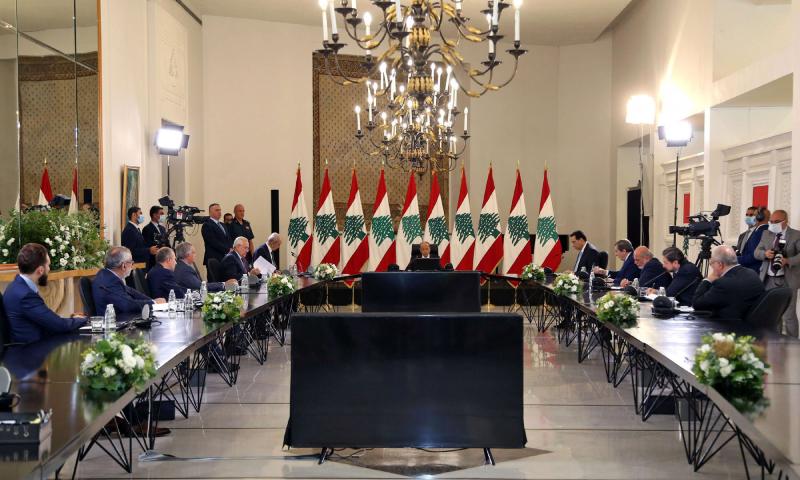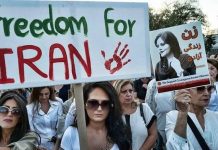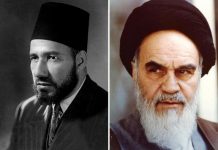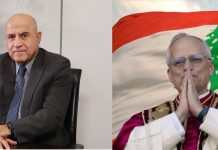Lebanon’s National Dialogue showcases disunity/The Arab Weekly/June 26/2020
جلسة الحوار الوطني في بعبدا ظهرت الإنقسام الكبير
Baabda meeting fails to address issue of Hezbollah’s weapons/The Arab Weekly/June 26/2020
اجتماع بعبدا يفشل في التطرق لسلاح حزب الله
Lebanese political experts considered the meeting called for by President Michel Aoun that was held Thursday at the Presidential Palace in Baabda to be a half-success for Hezbollah’s attempt to preempt any discussion related to the issue of its weapons.
These experts indicated that if the meeting succeeded in anything, it was in perpetuating the divisions within Lebanese society over the future of Hezbollah’s weapons, which many, especially Sunni Lebanese, see as the source of all the calamities that have befallen the country as it suffers an unprecedented economic crisis.
Political circles considered that the fact that there was no mention of Hezbollah’s weapons or of its role in implicating Lebanon in the war in Syria in the final statement of the meeting at Baabda Palace to be a relative victory for the party.
They also noted that the final statement ignored the role Hezbollah played in making the Lebanese crisis a part of the Syrian crisis, in the sense that the country is now facing the consequences of the US Caesar Act that imposes sanctions on anyone dealing with the Syrian regime.
However, these political circles saw in return that, despite Aoun’s efforts to keep the lid on the issue of Hezbollah’s weapons, the party still failed to garner a national consensus regarding its weapons, especially in light of the almost complete Sunni boycott of the Baabda meeting and in the context of an obvious and profound cleavage in the Christian camp.
They noted that former President Amine Gemayel and his son Sami, the head of the Kataeb Party, plus Samir Geagea, the head of the Lebanese Forces party, which has a bloc of 15 Christian deputies in the Lebanese Parliament, boycotted the meeting.
They also thought that Aoun’s attempt to brandish and exaggerate the spectre of a “civil war” in Lebanon was insulting to the intelligence of the Lebanese people.
In this regard, a Lebanese lawmaker wondered how the president could allow talk of the country coming close to a civil war when he knows very well which side launched sectarian slogans of the type “Shia, Shia, Shia” and insulted the Prophet’s wife Sayida Aisha.
This member of parliament added that the president’s talk of the risk of a civil war revealed his desire to cover up for Hezbollah’s practices and actions, which include ransacking part of downtown Beirut at a time when the country is dealing with a multifaceted crises that will be difficult to overcome as long as Aoun remains president.
Aoun’s allusion to a “civil war” was in part a reference to confrontations that took place in Beirut this month that reignited old sectarian wounds between Shias and Christians, and Shias and Sunnis.
As the Baabda meeting was taking place, dozens of demonstrators gathered amid tight security on the road to the presidential palace, denouncing the agenda of the meeting and security forces’ passive response to acts of violence perpetrated against peaceful demonstrators in different regions of the country.
Social media users criticised the meeting’s theme and title. One Twitter user, for example, wrote, “An economic collapse, a collapse of the banking system, a soaring dollar … severe poverty and Corona. What is the solution? A meeting in Baabda to emphasise civil peace and stave off sedition!”
But Aoun declared that “we have sensed a disturbing atmosphere of civil war, and witnessed suspicious moves rife with sectarian provocations.”
He also warned against those who take advantage of people’s anger and legitimate demands to generate violence and chaos, in order to achieve “suspicious foreign agendas” that intersect with political gains by local parties which he omitted to name.
The call for the meeting at Baabda Palace came against the backdrop of angry popular movements a couple of weeks ago that lasted for four days and were interspersed with acts of vandalism and confrontations with the security forces, especially in Beirut and Tripoli, in reaction to the free fall of the Lebanese lira against the US dollar on the black market. Two weeks ago, the dollar had crossed the threshold of five thousand liras causing widespread unrest, and then rose again this week to exceed six thousand liras.
President Aoun opened the meeting at the presidential palace saying, “today’s national meeting has only one item, and that is the protection of stability and civil peace, in light of recent developments.”
For his part, Prime Minister Hassan Diab said: “The country is not fine, and how can it be fine when citizens are going hungry? (…) The treatment is a national responsibility and not just the responsibility of a government that came to be on the ruins of the crisis.”
The Diab government took office on February 11, after protesters forced the government of former Prime Minister Saad Hariri to resign on October 29.
“We are going through a crucial stage in the history of Lebanon, which requires us to join efforts and put forth the country’s interests, so that we can reduce the damages, which might be disastrous … Our words have no value if we do not translate them into action,” Diab added.
Former Prime Ministers Saad Hariri and Najib Mikati said that the real threat to stability may come from the deteriorating economic and financial situation, “and this cannot be faced with loose meetings without a clear agenda.”
In a statement released on Monday, they said that Aoun’s invitation to meet “constitutes a waste of the time of the inviter and of the invitees at a time when the country needs (…) different approaches to extract it from its acute crisis.”
In recent days, sharp criticisms have been directed at the performance of Aoun and of the government in the face of the economic crisis and their failure to introduce practical measures.
Geagea, who was a partner in the political settlement that brought Aoun into office, told a press conference on Wednesday that “the only solution is for the ruling band to leave and step aside to let others save the country.”
Lebanon’s National Dialogue showcases disunity
The Arab Weekly/June 26/2020
جلسة الحوار الوطني في بعبدا ظهرت الإنقسام الكبير
BEIRUT –The Lebanese Forces Party joined in boycotting a dialogue meeting in Baabda, while the Druze leader of the Progressive Socialist Party Walid Jumblatt chose to hold the stick in the middle and dispatch his son, MP Taymor Jumblatt, to the conference.
The organisers of the meeting called for by Lebanese President Michel Aoun say it is intended to protect the country from discord and unite ranks to help confront the country’s dire financial crisis. However, some political forces that are boycotting the gathering argue it is simply a brainstorming session to save the ruling class, especially the Iran-backed Hezbollah group.
Aoun’s call to hold the national conference led to vetting the country’s political scene, repeating a scenario that happened following the assassination of former Lebanese Prime Minister Rafik Hariri in 2005.
During that period, Lebanon’s political class emerged as divided into two camps: Those supporting the withdrawal of Syrian forces and those backing the Syria-Iran axis.
With current political tensions high, there are signs that the March 14 Coalition, formed after Hariri’s assassination, could be revived, but this time for different reasons and with a different rationale.
This seems especially likely as opposition parties remain convinced that there must be deep reform in order to prevent the collapse of the country’s government and economy at a time when international pressure is piling up on Lebanon to implement such reforms and take major political steps, including the ouster of Hezbollah from power.
Speaking in Washington on Wednesday, US Secretary of State Mike Pompeo said real reforms are necessary before support is extended to the Lebanese government. He added that it must be a government that is not “beholden to Hezbollah.”
Hezbollah is on the US sanctions list and Washington considers it one of Iran’s most powerful proxies in the region.
“When that comes, when the government demonstrates, whoever that is, demonstrates their willingness and capacity to do that I think that not only the United States, but the whole world will come in to assist the Lebanese government get its economy back on its feet,” Pompeo said.
Iran-backed Hezbollah, designated by the US and other Arab and Western countries as a terrorist organisation, has strengthened its political position in recent years, taking root at the heart of Lebanon’s power structure.
This is one of the main reasons that the international community, especially the United States, is reluctant to provide financial support to Lebanon.
Speaking to American broadcaster CNBC on Wednesday, UAE Minister of State for Foreign Affairs Anwar Gargash said that Lebanon’s “economic meltdown is very worrying” but that the UAE would only consider offering financial support in concert with other states.
Gulf states have long channelled funds into Lebanon’s fragile economy but, like Washington, they are alarmed by the rising influence of Hezbollah, a powerful proxy of their arch-rival Iran.
“If we see some of our friends, major powers interested in Lebanon, working in a plan, we will consider that. But up to now, what we are really seeing here, is a deterioration of Lebanon’s Arab relations and Gulf relations over the past 10 years. Lebanon is partly paying the price for that right now,” Gargash said.
“We’ve seen an accumulation of problems in Lebanon and we’ve seen also a dictation of the political discourse by Hezbollah which really has an army within the state,” he added.
The international community’s reluctance to come to the rescue of Lebanon raised alarms among many opposition leaders, with the head of the Lebanese Forces party Samir Geagea calling for real action and genuine reform while snubbing the Baabda conference.
“We will not participate in a meeting whose aim is to throw dust in our eyes,” Geagea said Wednesday, adding that “Lebanese people are at odds with the authorities.”
“What’s required are decisions, not meetings, and moving the government toward making its first reform,” Geagea said.
“The problem is not with the government but with the ruling class that imposes upon the government whatever it wants it to do,” he added, noting that “as long as this reality exists, there will be no state in Lebanon.”
On the relationship with the former prime minister and leader of the Future Movement Saad Hariri, the leader of the Forces Party said, “contacts are constantly taking place.”





















